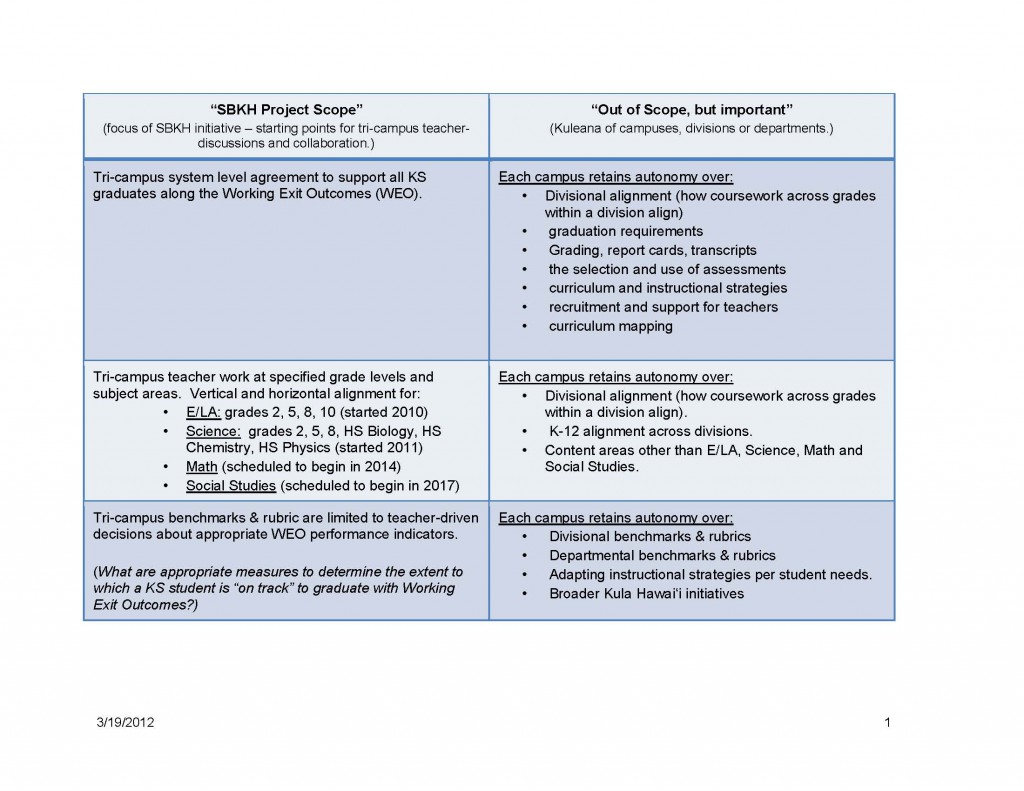Frequently Asked Questions
Q: “Projects come and go. How long will SBKH last?”
A: The SBKH Project Charter (available at: http://blogs.ksbe.edu/sbkh/home/project-charter/) was approved by the KS CEO Dee Jay Mailer and the project sponsors (headmasters from each of the campuses and Dr. Rod Chamberlain, VP of Campus Strategies and Academic Affairs) with institutional and systemwide commitment to plan, initiate, implement and close the SBKH project between 2010 and 2020. The SBKH Project Charter establishes institutional and tri-campus commitment “To improve student learning through the development and implementation of a tri-campus wide cyclical process that vertically aligns content standards and rubrics embedded in the Working Exit Outcomes (WEO) which are then implemented into all classroom instruction and assessment.”
Q: “Does the work of teachers need to be approved by administrators or anyone else?”
A: The SBKH project sponsors and Core Planning Team (CPT, comprised of curriculum coordinators, principals and project training team members from each of the three campuses) are committed to supporting a tri-campus cyclical process which is designed to support teacher collaboration to develop benchmarks and rubrics for targeted grades along the Working Exit Outcomes. The process is designed to initiate teacher collaboration to develop first iterations of benchmarks and rubrics for specific target grades, with the expectation that continued opportunities for teacher collaboration will allow teachers to continually enhance and build on their work.
Q: “What if there isn’t representation of teachers from all three campuses? Is there a risk that KSK will dominate the smaller campuses?”
A: Ideally, teachers from all three campuses will participate in all SBKH activities, however it has been agreed that tri-campus SBKH work will proceed, even if there isn’t tri-campus representation in a SBKH activity. Project staff are monitoring and documenting how the project progresses, to ensure that there are appropriate opportunities to initiate new teachers or teachers who missed one part of the SBKH process to be “on-boarded” to join teachers who may have had more experience with SBKH.
While the KSK campus is larger than the KSH and KSM campuses, so far, according to evaluations collected, teachers from all three campuses have found it valuable to collaborate on a tri-campus initiative.
Q: “How will we know when the work is good enough or done? What will the end product look like?”
A: Once the SBKH cyclical process of teacher collaboration is established, the process will be absorbed as a process for the campuses to adapt and sustain as a means to support excellence in student outcomes at all grades and in all subject areas. SBKH aims to support all KS graduates to excel with Working Exit Outcomes (WEO) fundamentally, but does not prescribe any standardized endpoints for any of the KS campuses, per se.
Q: “Will SBKH eventually mean every lesson in every class will have to be standardized according to an SBKH benchmark or rubric? Does every lesson have to reflect the WEO?”
A: No. SBKH tri-campus benchmarks and rubrics will be limite to teacher-driven decisions about appropriate WEO performance indicators for each KS student through their multi-year, schoolwide range of experiences at KS.
Q: “Will SBKH lead to the standardization of curriculum, instruction, or assessment? Will SBKH affect grading, or graduation requirements?”
A: No. Those are campus kuleana.
Q: “Will SBKH lead to the elimination of AP classes, college prep content and rigor?”
A: No. Those are campus kuleana.

